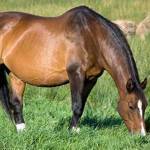Nocardioform Placentitis and Late-Term Fetal Loss

The most common cause of late-term abortion in mares is placentitis, a term that describes an inflammation of the placenta. A common type of placentitis results from environmental bacteria that ascend though the vagina and cervix. Signs of this infection, known as ascending placentitis, are early mammary development and lactation as well as a discharge from the vagina. Ascending placentitis causes lesions around the cervical star, and bacteria also affect the placenta and fetal fluids, infecting the foal.
Nocardioform placentitis is somewhat less common. Caused by specific types of bacteria called actinomycetes, nocardioform placentitis affects only the interface between the placenta and the uterine lining, the lower part of the uterine body, and the base of the uterine horn. The fetus itself is not infected, but because the infection interferes with nutritional support from the placenta, the foal is either aborted or is born undersized and underdeveloped.
When a mare shows signs of placentitis, a veterinarian can use transabdominal or transrectal ultrasound to differentiate between the types of infection. Affected mares can be treated with antibiotics, anti-inflammatory medications, and a high dose of a progestin-like hormone. Early treatment reduces the number of abortions, and most foals can survive.
In an average foaling season, a few cases of nocardioform placentitis are usually seen, but occasionally there is an upswing in cases with several hundred mares affected. Such a surge occurred in Kentucky in the spring of 2011, triggering new research into the causes of the disease.
At the University of Kentucky, groups of mares were given oral doses of nocardioform actinomycetes; had the bacteria injected directly into the bloodstream; were given intranasal spray containing the bacteria; or had their uteri inoculated with the bacteria either at the time of breeding or at day 270 of gestation. None of these mares developed placentitis, making it difficult to determine the route of infection. Mats Troedsson, a study leader, commented that the bacteria associated with nocardioform placentitis are fairly harmless in most instances. Therefore it is possible that some factor in the mare or in the environment changes, making the bacteria harmful.








